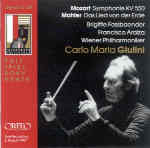Giulini made very few appearances at Salzburg. Indeed, he made few appearances anywhere, particularly in his later years, which makes this excellently recorded live document, approved for release just before his death, all the more important. It really is mostly marvelous, though the Mozart, with it’s slow outer movements, won’t be to all tastes. Still, this is the Vienna Philharmonic (on August 2, 1987), and under Giulini’s benevolent stewardship they make love to the music as only they can. Even though it lasts 35 minutes, with plenty of repeats intact, the performance is so beautiful that you probably won’t be able to resist, and it should be added that slow does not mean flaccid or inert. There are plenty of characterful touches of phrasing and balance that justify Giulini’s measured approach.
Still, for most listeners, it’s the Das Lied von der Erde that will constitute the main reason for acquiring this two-disc set, so I won’t keep you in suspense. It’s almost fabulous. Giulini recorded the work with these same soloists three years previously in Berlin for DG, but not only do both sound in better voice here, the Vienna Philharmonic still sounds far more comfortable than its Berlin counterpart in this music. Timings are almost identical in both cases, but Giulini permits himself more freedom of tempo and phrasing, making the first movement more impulsive (Araiza is amazing), and the coda of Von der Schönheit charmingly improvisatory after a savage central eruption. Just listen to Fassbaender spit out those words! You’ll also seldom hear the bitter edge of desperation in Der Trunkene im Frühling caught as effectively as in this performance, with both Araiza and Giulini flinging themselves at the music with thrilling abandon.
There are some minor slips typical of live performances (and of this orchestra in particular), most of them curiously associated with Fassbaender’s songs. Der Einsame in Herbst is memorably bleak, with some terrific wind solos and a hugely passionate outpouring at its climax, but Fassbaender gets so involved in the music that she sometimes forgets to count and her sense of rhythm is dicey. For example, she almost loses it in Der Abschied at “die müden Menschen”, and in the heat of the moment, at the passage beginning “Ich wandle, auf und nieder”, she gets way ahead of the beat. Happily she and Giulini meet up a few bars later and avoid disaster, but it’s a powerful reminder of just how difficult this music really is to keep together.
Staying with the finale, the central funeral march is restrained, and all the more touching for it, with ominous presence from the tam-tam. Somehow Giulini’s literal observance of Mahler’s “one beat per bar” directive for the concluding section, which produces a very swift tempo, makes more sense here than it did on DG, particularly with the final bars so well-judged and poetically shaped. Aside from some of the usual audience noises and what sounds like Giulini’s vocal contributions, the sonics really are first rate, far more flattering to the voices and the orchestra than DG’s harsh, multi-miked studio effort. So even if this isn’t quite perfect, its defects are minor, and the sense of occasion, so important as a counterpoise to the inevitable mishaps, comes across vividly. For many collectors, that will be all that matters.
































